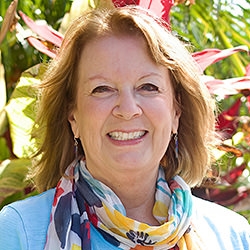
Search Results: resilience
-
-
-
When building successful relationships, it can be very helpful to see yourself as a collection of different inner parts that developed due to various life experiences. Without empathy and acknowledgment, our inner parts tend to work against us. That's when we're called upon to build and develop our inner leadership...
-
To keep our life energy moving and growing we can find the resources to welcome and accompany various parts of ourselves with compassion and love -- as though these parts are very young children. And even if these parts contain difficult emotions...
-
Jori and Jim Manske explore strengthening your empathy "muscle" for your own well being. Empathy can be a means to strengthen your own resilience, as well as being present for another person.
-
Trainer Tip: In challenging situations, we can be peaceful and clear when we are able to connect to what we value most, and to act in harmony with those values. For example, if a coworker does something you don't like, instead of gossiping about their undesirable behaviors, you can talk to them about how both of you feel regarding what happened, and focus on the needs you're both trying to meet at work.
-
In this stimulating audio recording, Stephanie Mattei covers several "hot" parenting topics such as: boundary issues, strategy resilience, how to shift your right/wrong mentality and understanding the concept of fairness. While unraveling these topics, Stephanie intersperses some practical neuroscience around brain regulation and brain-wise conflict prevention.
-
Given all that we are facing today as a society and a species, amongst some of the things we need is a well nourished heart. To nourish our hearts we need to discern where to wisely put our attention. Here are three practices to reclaim your attention, and replenish your reserves, so that you have the inner resources to do the work that is calling you. They are: train the mind, nourish the heart, and stay connected to purpose.
-
Living in this ceaselessly demanding world, how do we recover from emotional exhaustion? The hopelessness of not being met in the world can leave us wrung out like an old mop. Our heart rate plummets, our blood pressure and respiration drop, and energy and information processing start slogging along. Instead, we can build the bridge of empathy for greater rejuvenation.
-
During a crisis like the COVID-19 pandemic, we can draw upon inner and outer resources: gratitude, awareness of our senses and breath, plus compassion for self and others. We can also expand our understanding to curtail fear -- and limit the amount of time and energy we spend fighting and resisting the truth of what’s happening.
-
With these practices make space before reacting to emotion or external stimulus. This can enable your capacity to respond from your self-connection to universally shared values. With practice you can create the capacity to temporarily put impulsiveness aside, in the service of connection with yourself and others, and in service of more informed and effective strategies.
-
Jim and Jori offer a tip to stay present in the face of our reactivity to witnessed conflict.
-
We’re in the throws of a particularly worrisome presidential election in the USA. Combined with world affairs and the global warming of our earth, we are seeing a level of despair higher than I ever remember experiencing.
As a result, the level of blaming others, judgments, dis-ease, and lack of trust that I experience or hear about every day is at an all-time high. I think there’s so much fear that we’ve begun lashing out at others, and rage is either visible or ever lurking.
-
- Celebrate and nurture your relationship to the Earth — and each other!
- Explore your connections to family, partner, work, nature, self and more
- Discover new ways to grow in community and work together to make this world a better place
- Engage and immerse yourself in NVC while making new friends!
-
What is it that enables us to thrive? How can we influence our capacity to live a meaningful and fulfilling life? Join Jim and Jori Manske in this exciting telecourse recording on the intersection of NVC and cutting-edge Positive Psychology, the science of human thriving.
-
Join CNVC Certified Trainer Eric Bowers in journeying through the world of Interpersonal Neurobiology (IPNB) as he expands on the theories and tools from his book Meet Me In Hard-to-Love Places: The Heart and Science of Relationship Success. You'll discover why IPNB and NVC complement each other so well, especially in the powerful practice of Somatic-Based Resonant Empathy.
-
Does your inner dialog sound supportive and encouraging - or more like you’re being yelled at by a critical task-master? Gain an understanding of the neuroscience of the left and right hemispheres of the human brain and locate just where this savage inner voice is coming from and how to respond to it with empathy.
-
The pandemic has unsettled deep patterns of consumption. There’s a fear, and with it comes the mindset that is the heart of rampant consumption; habits which are essential to the market economy’s “economic recovery”. High consumption is also the most direct cause of environmental degradation. What do we need in order to significantly reduce consumption for our greater resilience and freedom, and to increase our planetary and human sustainability?
-
- Tune into your self-dialogue with a compassion that supports loving presence
- Shift limiting beliefs about your parenting patterns so you can choose consciously
- Transform frustration, confusion, or guilt into constructive, honest discussions
- Foster your ability to say yes and no in a way that supports your natural limits
-
Discover how the perennial strength of compassion and the living energy of needs can help you develop resilience in order to remain present with yourself and others amidst today's challenges.



















